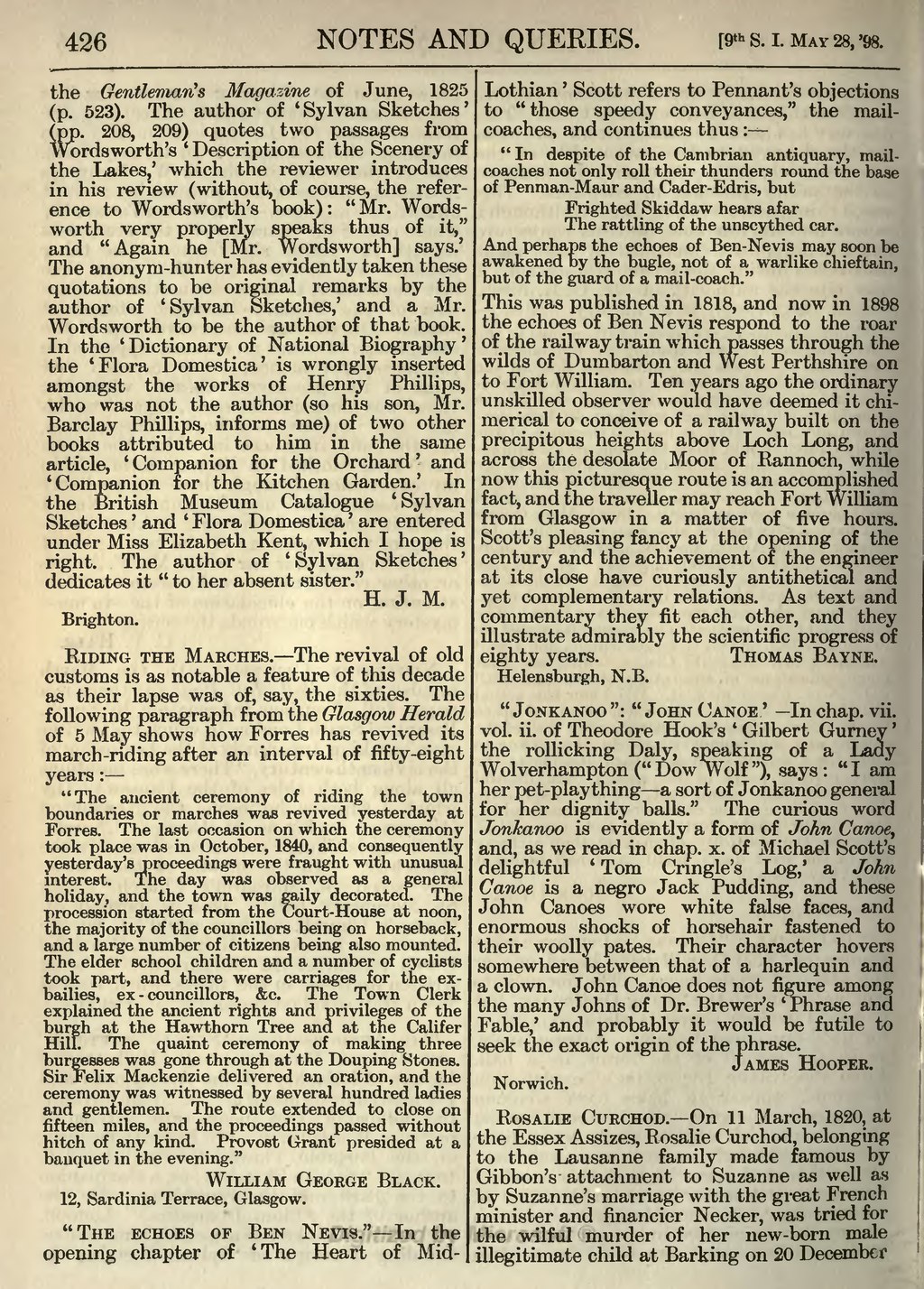426
NOTES AND QUERIES.
[9 th S. I. MAY 28, '98.
the Gentleman's Magazine of June, 1825
(p. 523). The author of 'Sylvan Sketches'
(pp. 208, 209) quotes two passages from
Wordsworth's ' Description of the Scenery of
the Lakes,' which the reviewer introduces
in his review (without, of course, the refer-
ence to Wordsworth's book) : " Mr. Words-
worth very properly speaks thus of it,'
and "Again he [Mr. Wordsworth] says.'
The anonym-hunter has evidently taken these
quotations to be original remarks by the
author of 'Sylvan Sketches,' and a Mr.
Wordsworth to be the author of that book.
In the 'Dictionary of National Biography'
the 'Flora Domestica' is wrongly inserted
amongst the works of Henry Phillips,
who was not the author (so his son, Mr.
Barclay Phillips, informs me) of two other
books attributed to him in the same
article, 'Companion for the Orchard' and
'Companion for the Kitchen Garden.' In
the British Museum Catalogue 'Sylvan
Sketches ' and ' Flora Domestica ' are entered
under Miss Elizabeth Kent, which I hope is
right. The author of 'Sylvan Sketches'
dedicates it " to her absent sister."
Brighton.
H. J. M.
RIDING THE MARCHES. The revival of old
customs is as notable a feature of this decade
as their lapse was of, say, the sixties. The
following paragraph from the Glasgow Herald
of 5 May shows how For res has revived its
march -riding after an interval of fifty -eight
years :
"The ancient ceremony of riding the town boundaries or marches was revived yesterday at Torres. The last occasion on which the ceremony took place was in October, 1840, and consequently yesterday's proceedings were fraught with unusual interest. The day was observed as a general holiday, and the town was gaily decorated. The procession started from the Court-House at noon, the majority of the councillors being on horseback, and a large number of citizens being also mounted. The elder school children and a number of cyclists took part, and there were carriages for the ex- bailies, ex - councillors, &c. The Town Clerk explained the ancient rights and privileges of the burgh at the Hawthorn Tree and at the Califer Hill. The quaint ceremony of making three burgesses was gone through at the Douping Stones. Sir Felix Mackenzie delivered an oration, and the ceremony was witnessed by several hundred ladies and gentlemen. The route extended to close on fifteen miles, and the proceedings passed without hitch of any kind. Provost Grant presided at a banquet in the evening."
WILLIAM GEORGE BLACK. 12, Sardinia Terrace, Glasgow.
"THE ECHOES OF BEN NEVIS." In the opening chapter of 'The Heart of Mid-
Lothian ' Scott refers to Pennant's objections
to "those speedy conveyances," the mail-
coaches, and continues thus :--
"In despite of the Cambrian antiquary, mail- coaches not only roll their thunders round the base of Penman-Maur and Cader-Edris, but Frighted Skiddaw hears afar The rattling of the unscythed car. And perhaps the echoes of Ben-Nevis may soon be awakened by the bugle, not of a warlike chieftain, but of the guard of a mail-coach."
This was published in 1818, and now in 1898 the echoes of Ben Nevis respond to the roar of the railway train which passes through the wilds of Dumbarton and West Perthshire on to Fort William. Ten years ago the ordinary unskilled observer would have deemed it chi- merical to conceive of a railway built on the precipitous heights above Loch Long, and across the desolate Moor of Kannoch, while now this picturesque route is an accomplished fact, and the traveller may reach Fort William from Glasgow in a matter of five hours. Scott's pleasing fancy at the opening of the century and the achievement of the engineer at its close have curiously antithetical and yet complementary relations. As text and commentary they fit each other, and they illustrate admirably the scientific progress of eighty years. THOMAS BAYNE.
Helensburgh, N.B.
"JONKANOO": "JOHN CANOE,' In chap. vii. vol. ii. of Theodore Hook's ' Gilbert Gurney ' the rollicking Daly, speaking of a Laay Wolverhampton (" Dow Wolf"), says: "I am her pet-plaything a sort of Jonkanoo general for her dignity balls." The curious word Jonkanoo is evidently a form of John Canoe, and, as we read in chap. x. of Michael Scott's delightful ' Tom Cringle's Log,' a John Canoe is a negro Jack Pudding, and these John Canoes wore white false faces, and enormous shocks of horsehair fastened to their woolly pates. Their character hovers somewhere between that of a harlequin and a clown. John Canoe does not figure among the many Johns of Dr. Brewer's ' Phrase and Fable,' and probably it would be futile to seek the exact origin of the phrase.
JAMES HOOPER.
Norwich.
ROSALIE CURCHOD. On 11 March, 1820, at the Essex Assizes, Rosalie Curchod, belonging to the Lausanne family made famous by Gibbon's- attachment to Suzanne as well as by Suzanne's marriage with the great French minister and financier Necker, was tried for the wilful murder of her new-born male illegitimate child at Barking on 20 December
